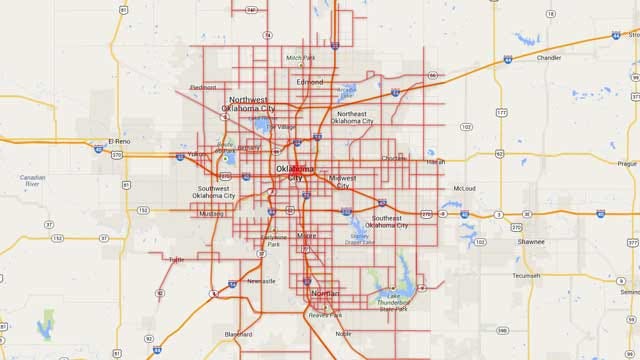Oklahoma Snow Routes
Sixteen cities, four counties and numerous state agencies in the metro joined together to develop a comprehensive snow route for the entire region, from Lexington to Guthrie and Yukon to Harrah.Thursday, December 5th 2013, 5:27 pm
Sixteen cities, four counties and numerous state agencies in the metro joined together to develop a comprehensive snow route for the entire region, from Lexington to Guthrie and Yukon to Harrah.
Check out OKC's winter weather page!
Drivers are advised to take extra precautions for the next few days, especially during Friday morning's commute, which is expected to be slick and treacherous. The city offers these driving safety tips:
• Stay home if you can.
• Use extra caution when driving over bridges and overpasses.
• Remember that posted speed limits are only to be followed during ideal weather conditions. Slow down while driving on snow or ice.
• Give salt trucks plenty of room – stay at least 100 feet behind them so salt won't get thrown on your car.
• Plan ahead by getting up and leaving the house earlier.
• Keep at least a three-car distance from the car in front of you
• Steer and brake more slowly than usual.
• Keep warm shoes and clothes in your car.
• Clear all snow and ice from your vehicle before setting out.
• Proceed carefully through intersections.
• Have a plan if you slide off the road - who are you going to call?
EMSA say people should be careful when heading out into the weather. People are often injured by slipping on icy, slick surfaces. Paramedics say the most dangerous types of injuries are head injuries. The damage can be difficult to treat and result in long-term health problems. Shoulder injuries are also a danger in icy weather.
EMSA says the following are also risks during low temperatures or low wind chills:
Frostbite: Frostbite causes a loss of feeling and a white or pale appearance in extremities such as fingers, toes, ear tips or the tip of the nose. If symptoms are detected, call 911.
Hypothermia: This develops when the body temperature drops below 95°F. Warning signs include uncontrollable shivering, disorientation, slurred speech and drowsiness. Call 911 immediately.
Overexertion: Cold weather puts an added strain on the heart. Unaccustomed exercise such as shoveling snow or pushing a car can bring on a heart attack or make an existing medical condition worse.
EMSA also suggests including these items in you winter survival kits in your car:
• Blankets or sleeping bags
• Flashlight with extra batteries
• First-aid kit
• Shovel, tools, booster cables and windshield scraper
• High-calorie non-perishable food (raisins, candy bars, energy/protein bars, etc.)
• Sand or cat litter to use for traction
More Like This
December 5th, 2013
November 13th, 2024
October 28th, 2024
October 17th, 2024
Top Headlines
January 12th, 2025
January 12th, 2025
January 12th, 2025
January 12th, 2025











